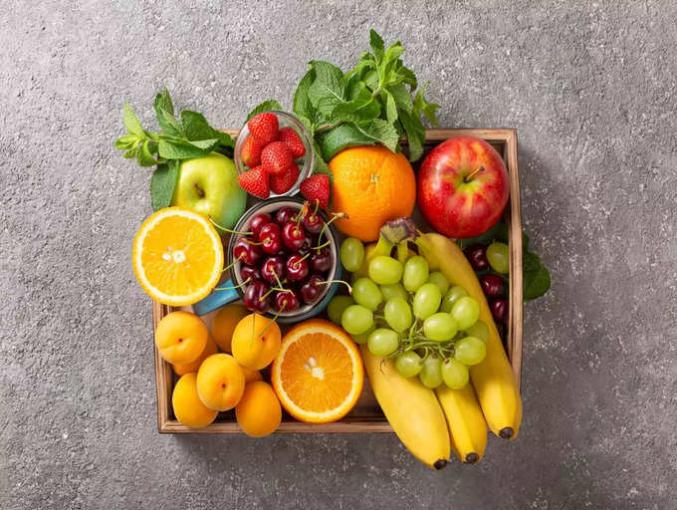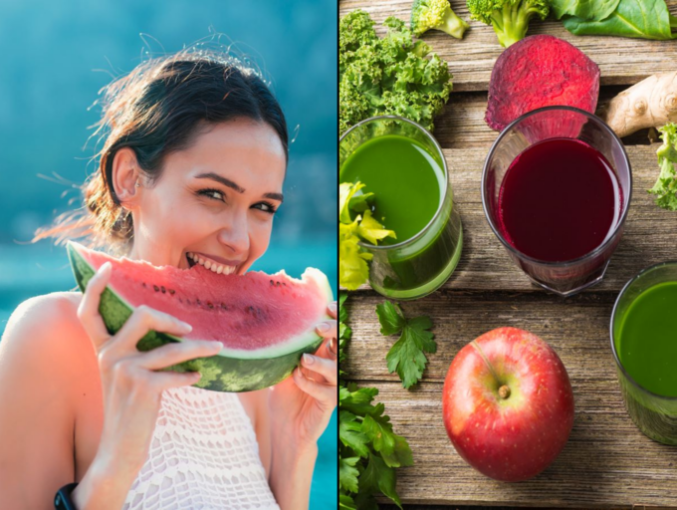Fruits are delicious, refreshing and rich in vitamins, minerals and antioxidants. However, many people wonder whether it is better to eat fruit directly or drink it in juice form.
1. Benefits of Eating Whole Fruit
Fruits provide many health benefits. Eating whole fruits provides your body with a lot of fiber, which can help improve digestion, control weight, and control blood sugar.
Eating fresh fruit in its whole form also nourishes your body with many vitamins, minerals, antioxidants, and health-promoting phytochemicals.
Fruits contain many vitamins and minerals that are essential for overall health. Eating fruit in moderation has also been linked to a reduced risk of obesity and chronic diseases.

Fruits provide fiber and many nutrients that are good for the body.
Eating a diet rich in fruits and vegetables has been linked to weight loss. Fruits are low in calories and high in fiber, which helps you feel full quickly without overeating.
Fruits that can aid in weight loss include berries, apples, pears, citrus fruits, and grapes. The best way to lose weight effectively is to eat a balanced diet rich in fruits, vegetables, lean proteins, and whole grains, combined with appropriate exercise.
2. Vitamins and minerals found in fruit juices are good for you
Fruit juices are packed with vitamins and nutrients, making them a recommended part of a healthy diet. Drinking juice every day is a convenient way to consume more fruit.
However, juices lack the fiber found in whole fruits and may not retain all the nutrients and antioxidants that you get when you eat fresh fruit.

Orange juice is a rich source of vitamins and minerals.
Some of the key vitamins and minerals found in many fruit juices provide health benefits, including:
– Vitamin C: This vitamin is important for cell growth and repair. Vitamin C helps build healthy bones, teeth, skin, cartilage and is important for a healthy immune system. Orange, pineapple, grapefruit, carrot, beetroot, and tomato juices are particularly good sources of vitamin C, providing at least 10% of the recommended daily intake.
– Vitamin A: Vitamin A is important for a healthy immune system, reproductive health, and eyes. Carrot and tomato juices are excellent sources of vitamin A.
– Vitamin B1 (thiamin): Helps the body process energy from food. Vitamin B1 is important for nervous system function. Orange and grapefruit juices are rich sources of thiamin.
– Folate: Helps the body produce healthy cells and genetic material such as DNA. For pregnant women, getting enough folate helps prevent birth defects such as spina bifida. Orange juice is a rich source of folate.
– Potassium: One of the most abundant minerals found in fruit juices. Potassium is essential for healthy nerve and muscle function. Orange juice, tomatoes, pomegranates, carrots, beets, and pineapples are all rich sources of potassium.
Fruit juice is a convenient and delicious way to increase the amount of fruits and vegetables in your daily diet. Like other fruits and vegetables, natural fruit juice is fat-free, low in sodium, and provides many important nutrients that support a healthy diet and lifestyle.
3. Is it better to drink juice or eat whole fruit?
Both fruit and fruit juice can be part of a healthy diet. However, whole fruit is considered a better choice. When you use fruit juice, it is not the same as eating the whole fruit. At this point, some of the great benefits of fruit are lost during the juicing process. The biggest of these is the fiber content, a benefit of whole fruit that is great for the digestive system. Whole fruit also gives the body a feeling of fullness compared to fruit juice.

Whole fruit also makes you feel fuller than fruit juice.
According to the United States Department of Agriculture, an adult should eat about 2 cups of fruit per day. One cup of fruit in its natural form is equivalent to one large orange or banana, one small apple, or eight strawberries.
When juicing, 1 cup of fruit yields about 8 ounces of juice. However, fruit juice can contain a lot of added sugar and calories, especially if you are drinking packaged juice.
If you choose to drink fruit juice, make sure you use fresh juice with no added sugar. It is better to squeeze or juice the fruit at home and retain as much fiber as possible.
You should drink pure fruit juice without added sugar and should consume the amount of fruit recommended for each age. Avoid drinking fruit juice on an empty stomach, especially for people with digestive problems such as stomach pain, etc.
In addition, juice does not replace fruits and vegetables, so it is recommended to eat whole pieces. So, in addition to drinking juice, don’t forget to add fiber to your daily diet. Prioritize choosing whole fruits as a snack or in salads or as part of a meal in your daily diet.





